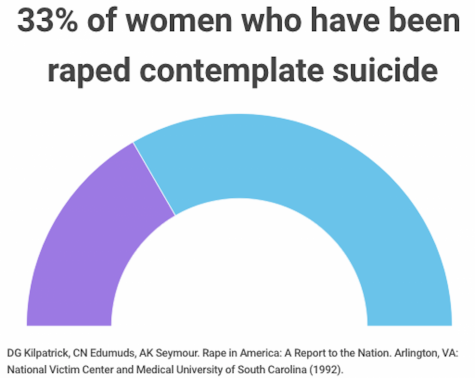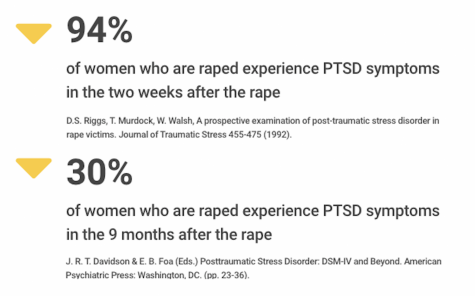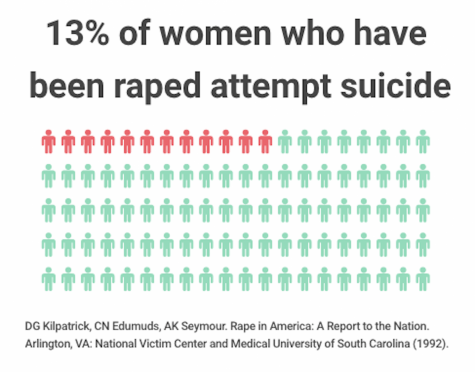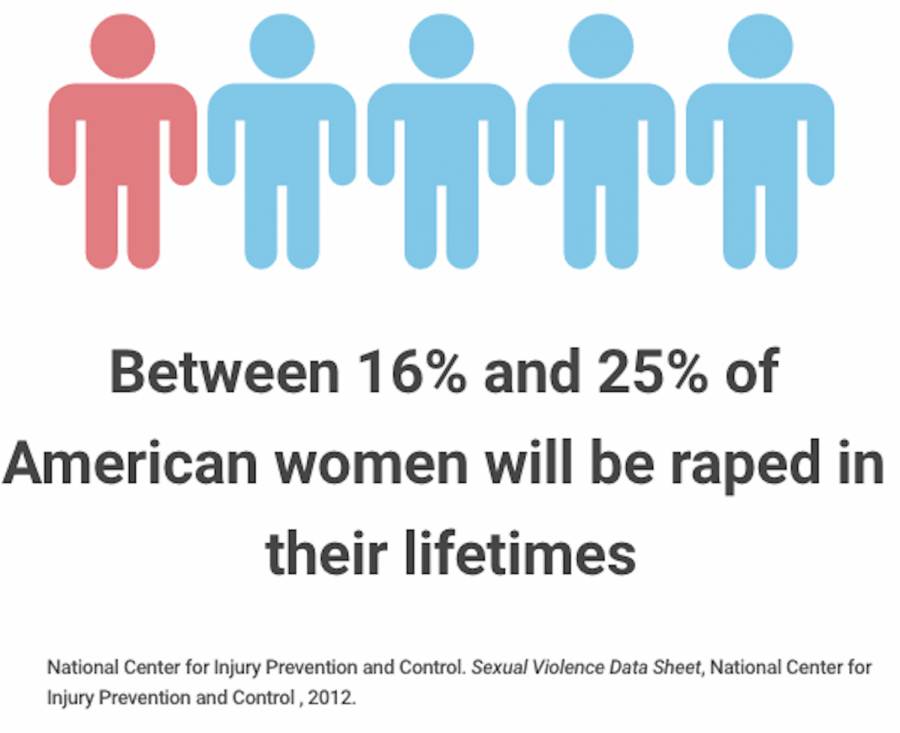Staff Ed: Sexual assault hurts victims, protects those in power, and cannot continue
From an attempted rape scene in “Happy Death Day,” to themes of sexual assault in “13 Reasons Why,” the media is saturated with references to and portrayals of sexual assault. However, recent revelations paired with the #metoo campaign––where women and men who have been victims of sexual assault share their stories on social media––have reminded us that sexual assault is not only a plot line, but a very real issue and a crime. Amid the recent Harvey Weinstein allegations, light has been shed on a problem not only in Hollywood, but in our society as a whole: there exists a culture that perpetuates sexual assault, neglects victims, and protects the powerful as opposed to those affected. One solution to this problem is educating people about consent and how to be advocates for victims.
One question overwhelms the conversation surrounding the Weinstein allegations: how was it possible for one man to take advantage of so many women–women who we widely know to be powerful, inspiring figures? One primary reason these allegations have gained ground is the platform and privilege fame has provided these women. Nevertheless, even with their fan bases, they continued to keep their silence, many only choosing to speak out after other actresses had already attested to Weinstein’s assaults. And Weinstein is not the only powerful man who faces these types of allegations; the New York Times reported on several women who have also accused Louis C.K and over 20 other men of sexual misconduct since the Weinstein story broke: allegations which have long been whispered about but are only now coming to the surface. This calls attention to the issue of rape in every facet of our workforce. If this many “famous” people have taken so long to disclose their assaults, we can only imagine the true scope of the issue. If people with a large safety net of wealth struggle to share their experiences, how can we expect people living paycheck to paycheck to speak out against those in positions of power, when speaking out can result in their termination? 
Harvey Weinstein was able to sexually assault women throughout the entertainment industry, all the while maintaining his image and success in the very same industry. This idea of “getting away with it” feeds into the entitlement of sexual assaulters and rapists, which is further upheld by our legal system. According to the Rape, Abuse & Incest National Network, only 6 out of every 1,000 rapists will be incarcerated (that’s only 0.6% of all rapists). Rape and sexual assault are crimes; they are not teenage mistakes or haphazard slip-ups, as is often argued by those who defend rapists and assaulters. “Why ruin his life all because of one little mistake?” This message serves to soften the harshness of the crime itself. It completely ignores the toll sexual assault takes on the victim. Rapists and sexual assaulters do not need to be cut any slack–they need to be prosecuted for their crimes. They need to go through rehabilitation and face their punishment in prison.
Weinstein’s conduct has been described as an “open secret” among many in the industry. The women who bravely shared their experiences with Weinstein have been supported and protected prim
arily because of the sheer number of other victims who are accusing Weinstein. However, it should not take over 80 cases for people to believe victims of sexual assault. As a society, we need to focus on supporting victims by listening to their experiences and––most importantly––by believing them. Often when the topic of believing those who report sexual assault is raised, critics’ knee-jerk response is to reference concerns about false reporting of sexual assault. This argument is weak at best; according to research done by the FBI, only 2% of reported rapes are deemed to be false accusations. That, combined with the fact that over 60% of sexual assaults go unreported, shows that victims should be believed and supported immediately.
Until we start believing victims, it is up to everyone else– all of the witnesses who hear whispers of sexual misconduct– to speak out against perpetrators. It is not the responsibility of victims to fix the culture that wronged them. Both men and women are sexually assaulted, the recent accusations against Kevin Spacey being a painful reminder that sexual assaulters do not discriminate when it comes to gender. However, the overwhelming majority of sexual assaulters are men: according to the National Intimate Partner and Sexual Violence Survey, 98.1% of females who have been raped were raped by a man; for male rape survivors, 93% of the perpetrators were male.
Because of this, it the responsibility of men to advocate for and support victims. Men must be the ones calling other men out for their unacceptable behavior. Several men, including Weinstein’s business partner Quentin Tarantino, openly admitted to hearing about his conduct before the allegations came out. However, these men continued to work with Weinstein.
Speaking up after the fact is not enough. Before someone becomes a sexual assaulter, they talk about it. The “locker room talk” that objectifies and dehumanizes women leads to sexual harassment, which in turn leads to assault. When men around you are making rape jokes, call them out on their words before those words turn into actions. If you know men who joke about rape, objectify, harass, or even assault people and you do nothing, you are complicit. But if men rally together to stop other men from seeing women as objects in the first place, they can help stop assault before it happens.
Turning the tide of a society that defaults towards objectifying women can only be achieved through education. Young girls are taught how to protect themselves from rapists before they can even understand what rape is. At every major milestone in their lives, they are reminded of the distinct possibility of assault: dressing scandalously in high school will tempt the men around you; take self defense classes before you go to college because sexual assault runs rampant on college campuses.
While these warnings are necessary, they also perpetuate the idea that it is a woman’s responsibility not to get sexually assaulted instead of it being a man’s responsibility not to sexually assault. Many men have already emerged as voices against rape culture, but it is by no means too much to ask that all men step up to denounce sexual assaulters and champion victims. Our society has all of the tools to make real change–especially as we see the public recoil in horror at the actions of Harvey Weinstein. This disgust is encouraging, but we cannot let it only be directed at those who have abused high-profile celebrities. As a culture, we need to take the final step in making sexual assault unacceptable in all circles and spheres of society.

















































